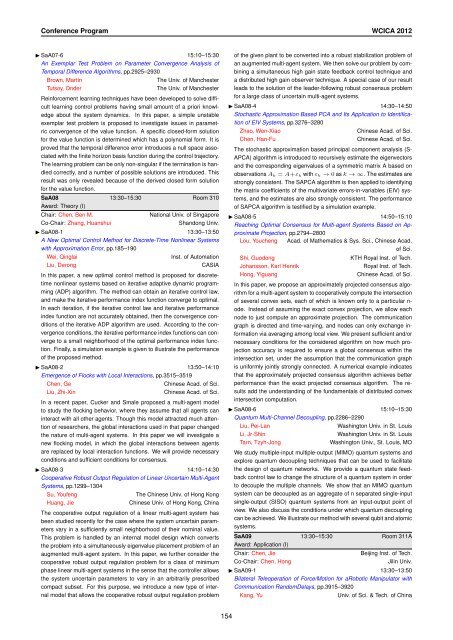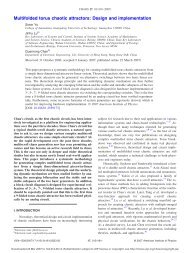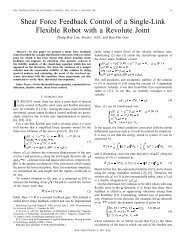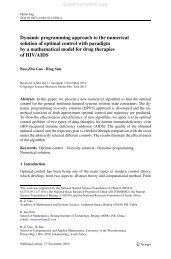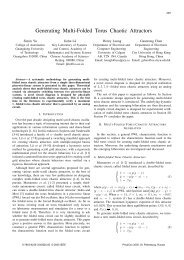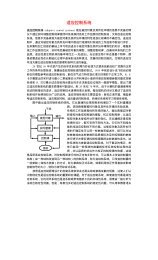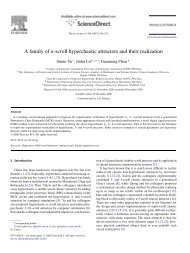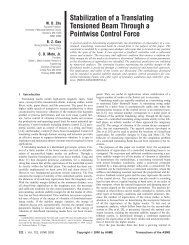Conference Program of WCICA 2012
Conference Program of WCICA 2012
Conference Program of WCICA 2012
You also want an ePaper? Increase the reach of your titles
YUMPU automatically turns print PDFs into web optimized ePapers that Google loves.
<strong>Conference</strong> <strong>Program</strong> <strong>WCICA</strong> <strong>2012</strong><br />
◮ SaA07-6 15:10–15:30<br />
An Exemplar Test Problem on Parameter Convergence Analysis <strong>of</strong><br />
Temporal Difference Algorithms, pp.2925–2930<br />
Brown, Martin<br />
Tutsoy, Onder<br />
The Univ. <strong>of</strong> Manchester<br />
The Univ. <strong>of</strong> Manchester<br />
Reinforcement learning techniques have been developed to solve difficult<br />
learning control problems having small amount <strong>of</strong> a priori knowledge<br />
about the system dynamics. In this paper, a simple unstable<br />
exemplar test problem is proposed to investigate issues in parametric<br />
convergence <strong>of</strong> the value function. A specific closed-form solution<br />
for the value function is determined which has a polynomial form. It is<br />
proved that the temporal difference error introduces a null space associated<br />
with the finite horizon basis function during the control trajectory.<br />
The learning problem can be only non-singular if the termination is handled<br />
correctly, and a number <strong>of</strong> possible solutions are introduced. This<br />
result was only revealed because <strong>of</strong> the derived closed form solution<br />
for the value function.<br />
SaA08 13:30–15:30 Room 310<br />
Award: Theory (I)<br />
Chair: Chen, Ben M.<br />
Co-Chair: Zhang, Huanshui<br />
National Univ. <strong>of</strong> Singapore<br />
Shandong Univ.<br />
◮ SaA08-1 13:30–13:50<br />
A New Optimal Control Method for Discrete-Time Nonlinear Systems<br />
with Approximation Error, pp.185–190<br />
Wei, Qinglai<br />
Liu, Derong<br />
Inst. <strong>of</strong> Automation<br />
CASIA<br />
In this paper, a new optimal control method is proposed for discretetime<br />
nonlinear systems based on iterative adaptive dynamic programming<br />
(ADP) algorithm. The method can obtain an iterative control law,<br />
and make the iterative performance index function converge to optimal.<br />
In each iteration, if the iterative control law and iterative performance<br />
index function are not accurately obtained, then the convergence conditions<br />
<strong>of</strong> the iterative ADP algorithm are used. According to the convergence<br />
conditions, the iterative performance index functions can converge<br />
to a small neighborhood <strong>of</strong> the optimal performance index function.<br />
Finally, a simulation example is given to illustrate the performance<br />
<strong>of</strong> the proposed method.<br />
◮ SaA08-2 13:50–14:10<br />
Emergence <strong>of</strong> Flocks with Local Interactions, pp.3515–3519<br />
Chen, Ge<br />
Liu, Zhi-Xin<br />
Chinese Acad. <strong>of</strong> Sci.<br />
Chinese Acad. <strong>of</strong> Sci.<br />
In a recent paper, Cucker and Smale proposed a multi-agent model<br />
to study the flocking behavior, where they assume that all agents can<br />
interact with all other agents. Though this model attracted much attention<br />
<strong>of</strong> researchers, the global interactions used in that paper changed<br />
the nature <strong>of</strong> multi-agent systems. In this paper we will investigate a<br />
new flocking model, in which the global interactions between agents<br />
are replaced by local interaction functions. We will provide necessary<br />
conditions and sufficient conditions for consensus.<br />
◮ SaA08-3 14:10–14:30<br />
Cooperative Robust Output Regulation <strong>of</strong> Linear Uncertain Multi-Agent<br />
Systems, pp.1299–1304<br />
Su, Youfeng<br />
Huang, Jie<br />
The Chinese Univ. <strong>of</strong> Hong Kong<br />
Chinese Univ. <strong>of</strong> Hong Kong, China<br />
The cooperative output regulation <strong>of</strong> a linear multi-agent system has<br />
been studied recently for the case where the system uncertain parameters<br />
vary in a sufficiently small neighborhood <strong>of</strong> their nominal value.<br />
This problem is handled by an internal model design which converts<br />
the problem into a simultaneously eigenvalue placement problem <strong>of</strong> an<br />
augmented multi-agent system. In this paper, we further consider the<br />
cooperative robust output regulation problem for a class <strong>of</strong> minimum<br />
phase linear multi-agent systems in the sense that the controller allows<br />
the system uncertain parameters to vary in an arbitrarily prescribed<br />
compact subset. For this purpose, we introduce a new type <strong>of</strong> internal<br />
model that allows the cooperative robust output regulation problem<br />
<strong>of</strong> the given plant to be converted into a robust stabilization problem <strong>of</strong><br />
an augmented multi-agent system. We then solve our problem by combining<br />
a simultaneous high gain state feedback control technique and<br />
a distributed high gain observer technique. A special case <strong>of</strong> our result<br />
leads to the solution <strong>of</strong> the leader-following robust consensus problem<br />
for a large class <strong>of</strong> uncertain multi-agent systems.<br />
◮ SaA08-4 14:30–14:50<br />
Stochastic Approximation Based PCA and Its Application to Identification<br />
<strong>of</strong> EIV Systems, pp.3276–3280<br />
Zhao, Wen-Xiao<br />
Chen, Han-Fu<br />
Chinese Acad. <strong>of</strong> Sci.<br />
Chinese Acad. <strong>of</strong> Sci.<br />
The stochastic approximation based principal component analysis (S-<br />
APCA) algorithm is introduced to recursively estimate the eigenvectors<br />
and the corresponding eigenvalues <strong>of</strong> a symmetric matrix A based on<br />
observations A k = A+ε k with ε k → 0 as k → ∞. The estimates are<br />
strongly consistent. The SAPCA algorithm is then applied to identifying<br />
the matrix coefficients <strong>of</strong> the multivariate errors-in-variables (EIV) systems,<br />
and the estimates are also strongly consistent. The performance<br />
<strong>of</strong> SAPCA algorithm is testified by a simulation example.<br />
◮ SaA08-5 14:50–15:10<br />
Reaching Optimal Consensus for Multi-agent Systems Based on Approximate<br />
Projection, pp.2794–2800<br />
Lou, Youcheng Acad. <strong>of</strong> Mathematics & Sys. Sci., Chinese Acad.<br />
<strong>of</strong> Sci.<br />
Shi, Guodong<br />
Johansson, Karl Henrik<br />
Hong, Yiguang<br />
KTH Royal Inst. <strong>of</strong> Tech.<br />
Royal Inst. <strong>of</strong> Tech.<br />
Chinese Acad. <strong>of</strong> Sci.<br />
In this paper, we propose an approximately projected consensus algorithm<br />
for a multi-agent system to cooperatively compute the intersection<br />
<strong>of</strong> several convex sets, each <strong>of</strong> which is known only to a particular n-<br />
ode. Instead <strong>of</strong> assuming the exact convex projection, we allow each<br />
node to just compute an approximate projection. The communication<br />
graph is directed and time-varying, and nodes can only exchange information<br />
via averaging among local view. We present sufficient and/or<br />
necessary conditions for the considered algorithm on how much projection<br />
accuracy is required to ensure a global consensus within the<br />
intersection set, under the assumption that the communication graph<br />
is uniformly jointly strongly connected. A numerical example indicates<br />
that the approximately projected consensus algorithm achieves better<br />
performance than the exact projected consensus algorithm. The results<br />
add the understanding <strong>of</strong> the fundamentals <strong>of</strong> distributed convex<br />
intersection computation.<br />
◮ SaA08-6 15:10–15:30<br />
Quantum Multi-Channel Decoupling, pp.2286–2290<br />
Liu, Pei-Lan<br />
Li, Jr-Shin<br />
Tarn, Tzyh-Jong<br />
Washington Univ. in St. Louis<br />
Washington Univ. in St. Louis<br />
Washington Univ., St. Louis, MO<br />
We study multiple-input multiple-output (MIMO) quantum systems and<br />
explore quantum decoupling techniques that can be used to facilitate<br />
the design <strong>of</strong> quantum networks. We provide a quantum state feedback<br />
control law to change the structure <strong>of</strong> a quantum system in order<br />
to decouple the multiple channels. We show that an MIMO quantum<br />
system can be decoupled as an aggregate <strong>of</strong> n separated single-input<br />
single-output (SISO) quantum systems from an input-output point <strong>of</strong><br />
view. We also discuss the conditions under which quantum decoupling<br />
can be achieved. We illustrate our method with several qubit and atomic<br />
systems.<br />
SaA09 13:30–15:30 Room 311A<br />
Award: Application (I)<br />
Chair: Chen, Jie<br />
Co-Chair: Chen, Hong<br />
Beijing Inst. <strong>of</strong> Tech.<br />
Jilin Univ.<br />
◮ SaA09-1 13:30–13:50<br />
Bilateral Teleoperation <strong>of</strong> Force/Motion for aRobotic Manipulator with<br />
Communication RandomDelays, pp.3915–3920<br />
Kang, Yu<br />
Univ. <strong>of</strong> Sci. & Tech. <strong>of</strong> China<br />
154


